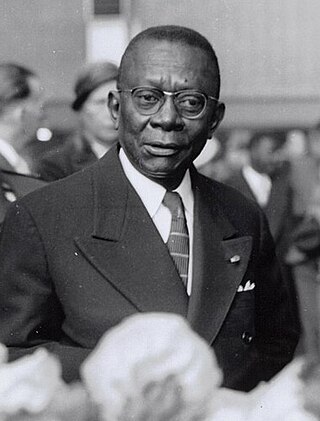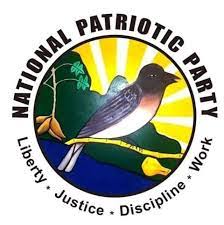
Liberia is a country in West Africa founded by free people of color from the United States. The emigration of African Americans, both freeborn and recently emancipated, was funded and organized by the American Colonization Society (ACS). The mortality rate of these settlers was the highest among settlements reported with modern recordkeeping. Of the 4,571 emigrants who arrived in Liberia between 1820 and 1843, only 1,819 survived (39.8%).

The Politics of Liberia takes place in a framework of a presidential representative democratic republic modeled on the government of the United States, whereby the president is the head of state and head of government; unlike the United States, however, Liberia is a unitary state as opposed to a federation and has a pluriform multi-party system rather than the two-party system that characterizes US politics. Executive power is exercised by the government. Legislative power is vested in both the government and the two chambers of the legislature.

The president of the Republic of Liberia is the head of state and government of Liberia. The president serves as the leader of the executive branch and as commander-in-chief of the Armed Forces of Liberia.

William Vacanarat Shadrach Tubman was a Liberian politician. He was the 19th president of Liberia and the longest-serving president in the country's history, serving from his election in 1944 until his death in 1971.

Joseph Jenkins Roberts was an American merchant who emigrated to Liberia in 1829, where he became a politician. Elected as the first (1848–1856) and seventh (1872–1876) president of Liberia after independence, he was the first man of African descent to govern the country, serving previously as governor from 1841 to 1848. He later returned to office following the 1871 Liberian coup d'état. Born free in Norfolk, Virginia, Roberts emigrated as a young man with his mother, siblings, wife, and child to the young West African colony. He opened a trading firm in Monrovia and later engaged in politics.

The National Patriotic Party (NPP) is a political party in Liberia. It was formed in 1997 by members of the National Patriotic Front of Liberia following the end of the First Liberian Civil War.

George Manneh Oppong Weah is a Liberian politician and former professional footballer who served as the 25th president of Liberia from 2018 to 2024. Before his election for the presidency, Weah served as senator from Montserrado County. He played as a striker in his prolific 18-year professional football career which ended in 2003. Weah is the first African former professional footballer to become a head of state, and the only African Ballon d'Or and FIFA World Player of the Year winner in history, winning both awards in 1995. He won the African Footballer of the Year 3 times and is considered one of the greatest strikers ever.

General elections were held in Liberia on 11 October 2005, with a runoff election for the presidency held on 8 November. The presidency and all seats in the House of Representatives and Senate were up for election. The elections were the first held since 1997 and marked the end of the political transition following the second civil war, having been stipulated in the Accra Comprehensive Peace Agreement of 2003. Ellen Johnson Sirleaf, former World Bank employee and Liberian finance minister, won the presidential contest and became the first democratically elected female African head of state in January 2006.

The vice president of the Republic of Liberia is the second-highest executive official in Liberia, and one of only two elected executive offices along with the president. The vice president is elected on the same ticket with the president to a six-year term. In the event of the death, resignation or removal of the president, the vice president ascends to the presidency, and holds the position for the remainder of their predecessor's term. The vice president also serves as the president of the Senate and may cast a vote in the event of a tie. The current vice president is Jeremiah Koung, serving under president Joseph Boakai. He began his term on January 22, 2024.
The Antoinette Tubman Stadium is a multi-purpose stadium located in Monrovia, Liberia. It is used mostly for football matches although it has also been used for music concerts, major church events, political rallies and Ebola treatment. It has a capacity of 10,000 spectators and is the oldest stadium in Liberia.

General elections were held for the first time in newly independent Liberia on September 27, 1847, alongside a constitutional referendum. The result was a victory for Governor Joseph Jenkins Roberts of the Pro-Administration Party, who defeated Samuel Benedict of the Anti-Administration Party. In a separate vote, Nathaniel Brander was elected vice president.

A constitutional referendum was held in Liberia on 27 September 1847. The new constitution would create a President with executive powers and a bicameral Legislature. It would also restrict voting rights to those of African descent and landowners. It was approved by 79% of voters. In Monrovia, Millsburg, Bassa Cove and Bexley 100% of voters supported the constitution, whilst 100% voted against it in Sinoe. In Edina opponents of the constitution prevented the polling station opening, and a fist-fight broke out between Amos Herrnig and Ephraim Titler, two of the Liberian Declaration of Independence signatories. Opponents of the constitution in Bassa Cove and Bexley chose not to vote.

General elections were held in Liberia in 1901. In the presidential election, incumbent Garreston W. Gibson of the True Whig Party was elected for the first time, having originally taken office after the resignation of William D. Coleman in December 1900. He defeated Coleman, who ran on the People's Party ticket.

General elections were held in Liberia in 1905. In the presidential election Arthur Barclay of the True Whig Party was re-elected. He defeated former President William D. Coleman, who ran on the People's Party ticket.

General elections were held in Liberia on 1 May 1951, the first to be held under universal suffrage; previously only male descendants of Americo-Liberians had been allowed to vote. This was the first elections in Liberia where women and the local Liberians owning property were allowed to vote based on a Constitutional Referendum in 1945–46. In the presidential election, William Tubman of the True Whig Party was the only candidate, and was re-elected unopposed.

Joseph D. Summerville served as the 15th vice president of Liberia from 1902 until his death in 1905. He served under Presidents Garretson W. Gibson and Arthur Barclay, making him the only person to serve as vice president under two separate presidents.
Ellen Mills Scarbrough was a Liberian educator and politician. She was elected to the House of Representatives in 1959, becoming the first woman in the Legislature.
Events in the year 2023 in Liberia.











